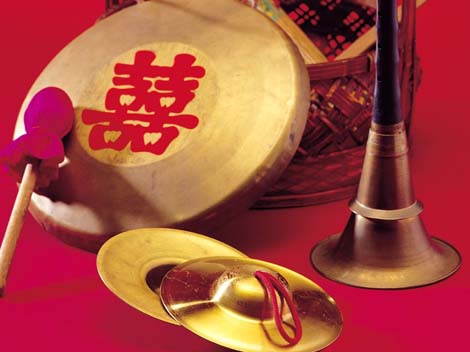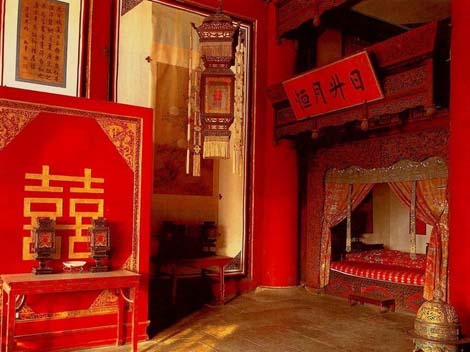
Over the past more than 5,000 years' evolution of the Chinese civilization, the wedding ceremony in China is still commonly referred to as "ru dongfang" (literally, entering cave chamber; i.e. the bridal chamber). Though mankind has moved from caves in ancient times to today's high buildings and large mansions, the phrase "ru dongfang" remains unchanged to this day. No one has ever mentioned "ru loufang" (entering the building) in place of "ru dongfang".

Legend has it that it was laid down by our ancestor Yellow Emperor, Xuanyuan.
After defeating Chiyou and bringing an end to the war, Yellow Emperor noticed that the communal marriage system might go against the solidarity of the newly-unified tribe alliance, for at that time marriages by capture were quite common among the tribes, not only men for women but also women for men.

He felt so worried that he turned to his ministers for advice on how to curb the communal marriage, but no one had ever put forth a feasible way.
Finally, inspired by the gregarious life in caves, the Yellow Emperor came up with an idea to assemble all people in the tribe and organize wedding ceremonies in celebration of the marriage wherein the newlywed would perform three bows to the Heaven and Earth, to their parents and between each other, declaring that the marital relation was officially established between them. After that, they would be sent into the prepared caves surrounded by tall walls and with only one door for entrance. Relatives from both families would offer water and food and they were supposed to stay in the cave for 40 days to three months to cultivate bonding as between spouses and learn to make fire, cook meals, and manage their life. From then on, those who had entered the "dongfang" (cave chamber) in the tribe were called official wife and husband. In order to tell the married from the unmarried, those married women were required to wear their disheveled hair in a bun.
Afterwards the foul habit of communal marriage was gradually dying out.
However, there were still some people in the tribe could not get used to the marital life immediately. It is said that there was once a young couple both of whom were good at hunting. The husband was named Shi Dun and the wife was called Mu Miao. They got married with the approval of their parents. After the wedding ceremony, they were sent into the "dongfang". However, less than 10 days later, both of them felt bored to stay with each other in the cave all day long, saying that the communal marriage would have been more interesting. Then they climbed over the walls late at night and fled into the woods respectively.
In the woods, with no human habitation in sight, they became increasingly impatient and finally got lost. At dawn, they came across each other in the woods and had to hang on to each other for survival. Only then did they realize that they could not live without each other now.
One day, they felt very tired and lay down under a big tree to have a rest, thirsty and hungry. Unfortunately, there happened to be a swarm of bees humming overhead which stung them black and blue. They lit a fire towards the cracks in the big tree to burn down the honeycomb from which the honey oozed out. At the very beginning, they did not know what it was but could not help tasting it because of its pleasant smell. It turned out to be fairly sweet. Making sure that it was nonpoisonous, they hurried to pick up the out-flowing honey and stayed in the woods with the honey for survival. Finally, they got rescued when the men of Yellow Emperor happened to find them a month later.
The young couple found that both of them could not live without each other after more than one month's hard times together in the woods. They had promoted their affections towards each other and came to understand the real meaning of love. After returning to the tribe, they never left each other again and afterwards set up a happy family.
That is how "entering the bridal chamber" (ru dongfang) and "having a honeymoon" (du miyue) come into being.





